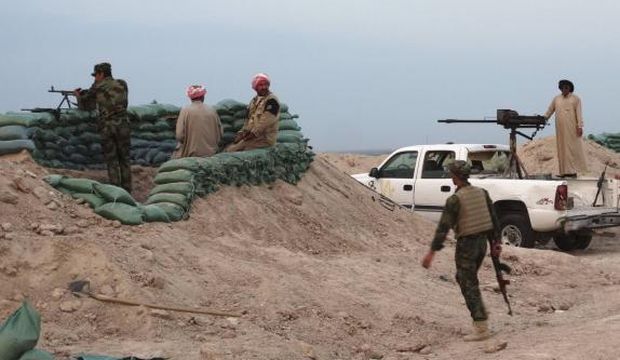
Tribal fighters carry their weapons as they take part in an intensive security deployment against Islamic State of Iraq and Syria (ISIS) militants in the town of Amiriyah Fallujah, in Anbar province, on October 31, 2014. (Reuters/Stringer)
Baghdad, Asharq Al-Awsat—The Islamic State of Iraq and Syria (ISIS) is practicing a “policy of genocide” against the Anbar province’s Albunimr tribe, taking “indiscriminate revenge” on its members, many of whom have participated in the Awakening movements fighting the extremist group in the western, Sunni-dominated province, an Iraqi MP and son of the leader of the tribe told Asharq Al-Awsat.
“This terrorist group [ISIS] has a hit-list of names of members of the Sahwa [Awakening] movements who also belong to the Albunimr tribe, and it has begun using a policy of genocide against them through the massacres it is carrying out on a daily basis,” Ghazi Al-Kaoud said on Tuesday.
Most of the tribe’s fighters in the movement had now made a “tactical withdrawal” to Haditha, Kaoud said, in order to regroup and begin planning the liberation of the city of Hit from ISIS and “to avenge those members of the tribe who have been killed, because the majority of those of the tribe who remain [alive] comprise innocent civilians—men, women, students and children.”
He said the extremist group was now enacting an “policy of indiscriminant revenge” against all members of the Albunimr tribe, “beginning with the acts of mass murder it is carrying out against us on a daily basis, the latest of which came two days ago [Sunday], and we have received information that in this new massacre around 35 people were killed, bringing the total [number of Albunimr members] killed by ISIS to more than 500 people.
“This doesn’t include all the hundreds of families [from the tribe] who have been driven from their homes and pursued and blockaded in the desert, with no security forces reaching them to lift the blockade,” he added.
In a statement regarding the fight against ISIS in Anbar, Speaker of Parliament Salim Al-Jabouri said he had met with Kaoud, and added that it was now “incumbent upon the government and the international community to help . . . our tribes [in Anbar] who have proven their loyalty to Iraq and have given their blood for the country.”
He warned that if this did not happen, areas of Anbar such as Hit would be in danger of seeing “further massacres” by the extremist group and risked becoming a “new Kobani.”
Speaking of government efforts to help the tribe, Kaoud said the leaders of the tribes had conducted “many meetings” with Prime Minister Haider Al-Abadi, Defense Minister Khaled Al-Obaidi, and Jabouri.
“We have received promises from them that they will soon begin military operations to liberate Hit and other areas of Anbar [under ISIS control]. But this will not be enough for us; we must take revenge on ISIS for the acts of murder it has committed against the Albunimr tribe,” Kaoud said.
Around 3,000 Shi’ite volunteer fighters, along with two regiments from the Iraqi military, have arrived in Anbar province in the last few days, having been airlifted to Habania Airport, east of Ramadi. They are now being transported to the Ain Al-Assad military base, some 43 miles (70 kilometers) west of the city to liberate western areas of the province such as Hit, which is currently under the control of ISIS.
Speaking of these reinforcements, Kaoud said: “These efforts are incredibly important for us as they embody the spirit of brotherliness between all Iraqis, and this proves that the plan ISIS has for dividing Iraqis has failed, since what we are seeing now is the complete opposite.”
“The arrival of these large numbers of Shi’ite brothers from Sadr City and others, as well as our brothers from southern tribes, came as a result of our calls for assistance that were directed to religious leaders and politicians from among our Shi’ite brothers, whose hearts are with us and whose swords are against our enemies.”
The Sunni-dominated Anbar province has, since the 2003 US-led invasion of Iraq, been a hotbed for sectarian tensions, with many Sunni extremist groups using this as a springboard to gain support there.
There have been fierce battles between the Iraqi army and ISIS in the city of Fallujah and the provincial capital Ramadi since the start of the year, with the extremist group taking control of parts of both cities for extended periods of time.
The ISIS advance coincided with mass demonstrations staged in the province, protesting against what residents deemed as policies of marginalization by the Shi’ite-dominated government of former prime minister Nuri Al-Maliki. The protests were later cleared forcibly by security forces, and one prominent Sunni MP in the province was killed in the process, sparking further unrest.
